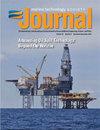OneArgo: A New Paradigm for Observing the Global Ocean
IF 0.7
4区 工程技术
Q4 ENGINEERING, OCEAN
引用次数: 6
Abstract
Abstract OneArgo is a major expansion of the Argo program, which has provided two decades of transformative physical data for the upper 2 km of the global ocean. The present Argo array will be expanded in three ways: (1) Global Core: the existing upper ocean measurements will be extended to high latitudes and marginal seas and with enhanced coverage in the tropics and western boundaries of the major ocean basins; (2) Deep: deep ocean measurements will be obtained for the 50% of the global oceans that are below 2,000-m depth; and (3) Biogeochemical: dissolved oxygen, pH, nitrate, chlorophyll, optical backscatter, and irradiance data will be collected to investigate biogeochemical variability of the upper ocean and the processes by which these cycles respond to a changing climate. The technology and infrastructure necessary for this expansion is now being developed through large-scale regional pilots to further refine the floats and sensors and to demonstrate the utility of these measurements. Further innovation is expected to improve the performance of the floats and sensors and to develop the analyses necessary to provide research-quality data. A fully global OneArgo should be operational within 5‐10 years.OneArgo:观测全球海洋的新范式
摘要OneArgo是Argo计划的一个重大扩展,该计划为全球海洋上游2公里提供了20年的变革性物理数据。目前的Argo阵列将以三种方式扩展:(1)全球核心:现有的上层海洋测量将扩展到高纬度和边缘海,并在热带和主要海盆的西部边界扩大覆盖范围;(2) 深海:将对全球50%深度在2000米以下的海洋进行深海测量;和(3)生物地球化学:将收集溶解氧、pH、硝酸盐、叶绿素、光学背散射和辐照度数据,以研究上层海洋的生物地球化学变化以及这些循环对气候变化的反应过程。目前正在通过大规模的区域试点开发扩建所需的技术和基础设施,以进一步改进浮子和传感器,并证明这些测量的实用性。进一步的创新有望提高浮子和传感器的性能,并开发必要的分析,以提供研究质量数据。一个完全全球化的OneArgo应在5-10年内投入运营。
本文章由计算机程序翻译,如有差异,请以英文原文为准。
求助全文
约1分钟内获得全文
求助全文
来源期刊

Marine Technology Society Journal
工程技术-工程:大洋
CiteScore
1.70
自引率
0.00%
发文量
83
审稿时长
3 months
期刊介绍:
The Marine Technology Society Journal is the flagship publication of the Marine Technology Society. It publishes the highest caliber, peer-reviewed papers, six times a year, on subjects of interest to the society: marine technology, ocean science, marine policy, and education.
 求助内容:
求助内容: 应助结果提醒方式:
应助结果提醒方式:


